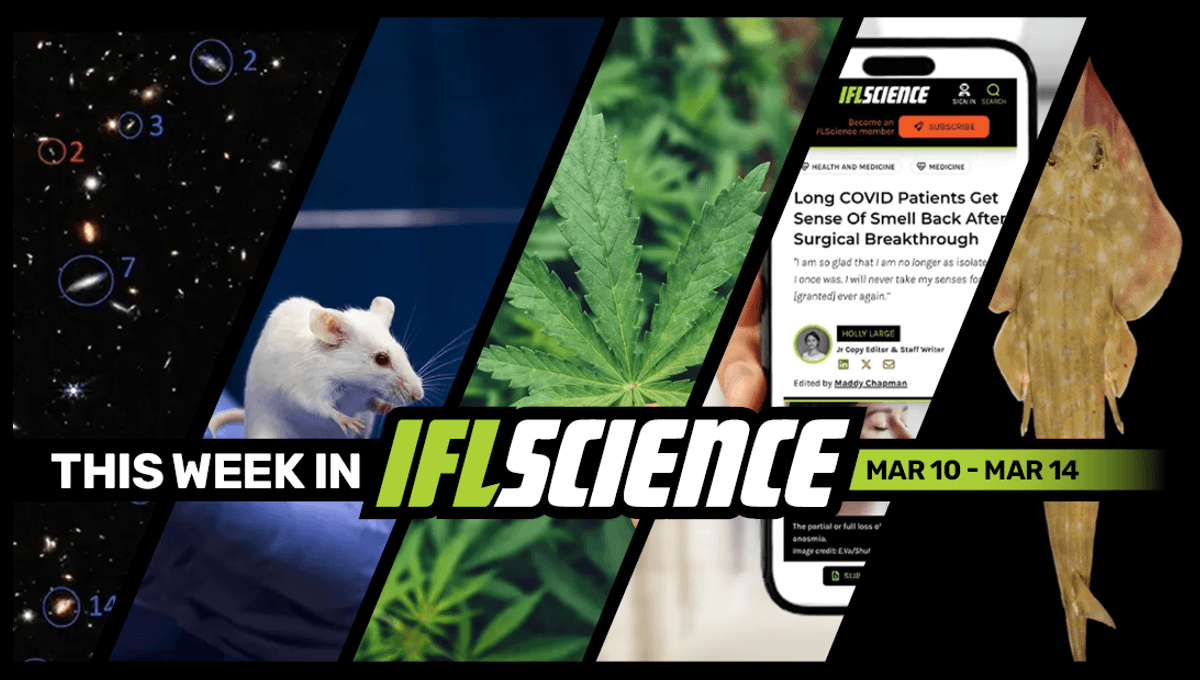
This week, scientists have put a human “language gene” into mice and found it has a profound impact on the rodents’ ability to squeak, research has found that reading science articles (like these ones) can help you stay mentally strong, and in a global mission to explore Earth’s oceans, over 850 new marine species have been discovered. Finally, we discuss why humans thought mercury, a toxic metal, was good for you.
Create an IFLScience account to get all the biggest science news delivered straight to your inbox every Wednesday and Saturday.
Unexpected JWST Observations Hint We Might Be Inside A Black Hole
ADVERTISEMENT
A new study looking at observations by the JWST of the early universe has thrown up a new and intriguing mystery; the majority of galaxies appear to be rotating in the same direction. This finding, not predicted by our current understanding of the universe, may hint that we are inside a black hole, according to the study’s authors. Read the full story here
Scientists Put A Human “Language Gene” Into Mice And Curious Things Unfolded
In a quest to understand complex speech, scientists inserted what’s been dubbed a human “language gene” into mice. Remarkably, the genetic tweak had a profound impact on the little rodents’ ability to squeak, revealing astonishing clues about the evolution of vocal communication. Read the full story here
A New Synthetic Cannabinoid Could Pack A Painkilling Punch – Without The High
In a new step forward on the quest for better painkillers, scientists have developed a synthetic cannabinoid that keeps the pain-relieving properties of cannabis without being addictive or psychoactive. They’re now planning the development of an oral drug based on the discovery that will hopefully make it to human clinical trials. Read the full story here
Why Reading Science Articles (Like This One!) Can Help You Stay Mentally Young
The secret to remaining mentally astute into old age? Keep reading – no, literally. New research has shown that cognitive decline is not inevitable. Frequently using literacy and numeracy skills – whether by checking an email, calculating the grocery budget, or reading a science news article – can keep the brain sharp and prevent decline in those areas. Read the full story here
Over 850 New Marine Species Discovered In Global Mission To Explore Our Earth’s Ocean Life
A total of 866 new marine species have been discovered in just 16 months by the Nippon Foundation–Nekton Ocean Census as they embark on the world’s most extensive mission to discover ocean life. Among the new-found critters are the good, the badass, and the ugly. This includes new species of shark, sea butterfly, mud dragon, bamboo coral, water bear, octocoral, sponge, shrimp, crab, reef fish, squat lobster, pipehorse, limpet, hooded shrimp, sea spiders, and brittle stars. Read the full story here
TWIS is published weekly on our Linkedin page, join us there for even more content.
Feature of the week:
Mercury: The “Cure” That Killed
In 1821, the English Romantic poet John Keats died at the young age of 25 after succumbing to tuberculosis. Although his work inspired many influential poets throughout the 19th century, his short life was also one of intense suffering, especially in the run-up to his early death. But while many people are aware of the role tuberculosis played in his ultimate demise, fewer know that the poet’s health may have been damaged by the deadly effects of the “cures” he used to treat himself. Read the full story here
More content:
Have you seen our e-magazine, CURIOUS? Issue 32 March 2025 is available now. This month we asked, “Can We Really Trust Our Memories?” – check it out for exclusive interviews, book excerpts, long reads, and more.
PLUS, the We Have Questions podcast – an audio version of our coveted CURIOUS e-magazine column – continues. In episode 6, we ask “Why Do Humans Play Games?”
Season 4 of IFLScience’s The Big Questions podcast has concluded. To revisit all of season four’s episodes, click here.
Source Link: JWST Observations Hint We Might Be Inside A Black Hole, A New Synthetic Cannabinoid Could Pack A Painkilling Punch, And Much More This Week